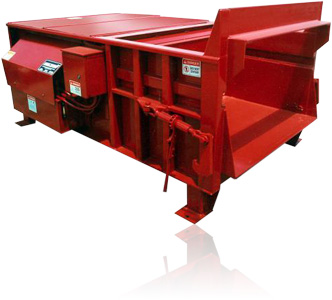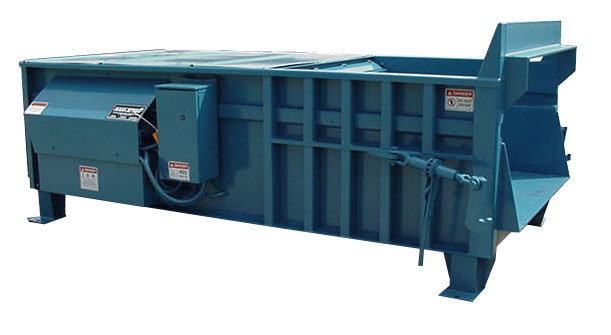The Function of Waste Equipment in Promoting Sustainable Garbage Disposal Practices
Waste Equipment serves a basic function ahead of time lasting waste disposal practices. It includes a series of devices designed to improve the efficiency of waste processing, segregation, and collection. By making use of Equipment such as compactors, shredders, and recycling bins, areas can significantly decrease their dependence on landfills. The effect of these tools prolongs past performance. Recognizing their more comprehensive effects discloses insights into exactly how they shape environmental obligation and community involvement. What lies ahead in this developing landscape?
Understanding Waste Equipment and Its Relevance
Waste Equipment plays a necessary role in reliable waste administration systems. It incorporates a series of tools and equipment made to take care of, procedure, and get rid of waste materials effectively. Recognizing waste Equipment is essential for organizations, districts, and organizations aiming to implement sustainable waste disposal practices - Commercial garbage compaction equipment. Appropriately operating waste Equipment not just improves the collection and transport of waste but additionally reduces ecological effect by guaranteeing that waste is handled sensibly
The relevance of waste Equipment reaches enhancing reusing initiatives, reducing landfill usage, and promoting source recovery. Equipment such as shredders, compactors, and balers help with the processing of waste, making it easier to divide recyclable products from general refuse. Furthermore, developments in waste innovation contribute to the growth of more eco-friendly services, consequently enhancing the dedication to sustainability. Overall, waste Equipment works as a foundation for reliable waste monitoring, cultivating a cleaner and much healthier atmosphere for future generations.
Kinds Of Waste Equipment for Effective Waste Monitoring
Effective waste administration counts on numerous kinds of Equipment designed to deal with details disposal demands. Amongst these, compactors play an important role by decreasing the volume of waste, making transport a lot more reliable. Shredders are vital for breaking down large items, promoting less complicated handling and disposal. Additionally, balers press recyclable products into manageable bundles, optimizing storage space and transport.
Containers and bins are fundamental for accumulating waste at the source, assuring appropriate segregation and reducing contamination. For harmful materials, specialized Equipment, such as drum crushers and watertight containers, is needed to guarantee safety and conformity with laws.
Transport cars geared up with hydraulic systems boost the performance of waste collection and disposal processes. Each sort of waste Equipment adds to a streamlined waste monitoring system, advertising sustainability and minimizing ecological influence via reliable disposal practices.
The Role of Reusing Containers in Lasting Practices
Recycling bins play an essential duty in promoting sustainable techniques by helping with reliable waste separation. By supplying designated containers for recyclable materials, they encourage individuals to take on green actions. This easy application considerably adds to minimizing landfill waste and enhancing recycling rates.
Effective Waste Separation
Correct waste splitting up plays an important function in advertising sustainable practices, and recycling containers work as a significant tool in this procedure. By plainly distinguishing between recyclables, compostables, and general waste, these containers assist in reliable sorting, lessening contamination and making the most of recycling performance. Their strategic positioning in private and public areas urges individuals to join liable garbage disposal. The use of color-coded containers aids to simplify the separation procedure, making it intuitive for customers. This organizational approach not just improves recycling rates however additionally raises understanding regarding the value of waste monitoring. Essentially, reusing containers are essential parts that sustain reliable waste splitting up, eventually adding to an extra sustainable environment and lowering the overall stress on landfills.
Motivating Eco-Friendly Behavior
Although individuals may be inclined to forget their influence on the environment, the presence of reusing containers substantially influences environmentally friendly actions. These containers function as visual reminders, encouraging people to separate recyclables from general waste. Their critical positioning in public rooms promotes accessibility, making it simpler for people to embrace lasting techniques. Researches indicate that when recycling bins are readily available, recycling rates raise considerably, reflecting a direct connection in between facilities and actions. In enhancement, colorful signage on these bins informs customers concerning what materials can be recycled, reducing contamination rates. By promoting a society of recycling, these bins not just facilitate correct waste administration however likewise inspire a cumulative responsibility towards ecological stewardship, ultimately adding to a much more sustainable future.
Composting Systems: Turning Waste Into Resources
Composting systems act as a vital tool in changing organic waste right into valuable sources, providing various environmental advantages. Various kinds of composting Equipment provide to various requirements, making the procedure easily accessible to both individuals and communities. Comprehending the composting procedure is necessary for optimizing its performance and advertising lasting waste monitoring techniques.
Benefits of Composting Systems
Several neighborhoods are significantly acknowledging the countless benefits of composting systems, which change natural waste into useful sources. These systems properly lower landfill waste, therefore decreasing greenhouse gas discharges and conserving natural deposits. By transforming food scraps, lawn waste, and various other organic materials right into nutrient-rich garden compost, they enhance dirt wellness and fertility, advertising lasting farming methods. In addition, composting aids to retain dampness in the dirt, reducing the requirement for chemical fertilizers and watering. It fosters biodiversity by providing a habitat for valuable microbes and bugs. Additionally, composting enlightens individuals regarding ecological stewardship, urging a society of sustainability. On the whole, composting systems play a crucial role in producing a round economic situation, where waste is decreased, and sources are reused.
Kinds Of Composting Equipment
A range of composting Equipment is readily available to facilitate the reliable processing of natural waste into valuable garden compost. These systems vary from basic yard compost containers to sophisticated commercial composters. For home use, stemless glass and static bins are popular, enabling workable aeration and blending. Oxygenated static stacks use blowers to boost airflow, greatly quickening disintegration. Large-scale procedures may use in-vessel composters, which control temperature level and humidity for ideal composting conditions. Worm composters, or vermicomposting systems, harness the all-natural digestive procedures of worms to break down natural matter. In addition, shredders and chippers aid prepare materials by decreasing dimension, promoting faster malfunction. Each kind of Equipment serves specific requirements, making it possible for varied composting practices that add to sustainable waste administration.
Composting Refine Explained
The composting process transforms natural waste into nutrient-rich sources with a collection of chemical and biological responses. Bacteria such as fungi and germs break down natural products, including food scraps and backyard waste. This decay generates warm, assisting in further microbial task and speeding up the failure process. As the garden compost develops, the temperature level decreases, allowing useful microorganisms to prosper. The existence of oxygen is essential, advertising cardio conditions that enhance microbial effectiveness. Throughout this process, carbon-to-nitrogen ratios need click to read more to be kept to optimize decomposition. Completion result is humus, a dark, brittle material rich in nutrients, which can be her latest blog made use of to enhance dirt, assistance plant growth, and add to sustainable agricultural techniques.
Innovative Technologies in Waste Collection and Disposal
As cities come to grips with raising waste volumes and ecological problems, ingenious technologies in waste collection and disposal arise as important remedies. Smart waste containers equipped with sensors track fill levels, maximizing collection routes and decreasing gas intake. These bins can additionally communicate with waste administration systems, lessening and facilitating timely pickups overflow concerns. On top of that, independent lorries, consisting of drones and robot systems, are being released to boost operational performance in waste collection.
Developments in sorting technologies, such as expert system and device understanding, make it possible for more reliable reusing procedures by swiftly determining and dividing products. Waste-to-energy technologies convert natural waste into sustainable energy, minimizing land fill reliance and contributing to power sustainability. These advancements not just streamline waste management techniques yet also promote a round economic climate, thereby promoting a lasting technique to lose disposal. Ultimately, the integration of these technologies plays an essential role in dealing with metropolitan waste difficulties and improving ecological stewardship.
Area Involvement With Waste Equipment
While reliable waste management depends heavily on innovative technologies, neighborhood involvement via waste Equipment plays an essential function in promoting lasting techniques (Commercial garbage compaction equipment). Waste Equipment, such as recycling bins and composting stations, serves not just as useful devices however also as drivers for neighborhood understanding and engagement. By positioning these resources in accessible areas, municipalities urge people to take an energetic role in waste reduction and recycling initiatives
Educational projects accompanying waste Equipment setups can additionally improve area involvement, guiding locals on proper disposal approaches and the advantages of lasting techniques. Furthermore, neighborhood events that utilize waste Equipment, such as clean-up drives and reusing challenges, inspire collective action and build a sense of obligation amongst area participants.

The Future of Waste Management and Sustainable Solutions
Advancements in innovation and changes in societal mindsets are shaping the future of waste management and sustainable solutions. Smart waste administration systems, utilizing IoT devices, are enabling real-time surveillance of waste degrees, optimizing collection courses, and lowering carbon impacts. These improvements not just improve effectiveness yet likewise advertise recycling and composting efforts by providing data-driven understandings.
In addition, the increase of circular economy methods motivates firms to rethink item style, concentrating on reusability and recyclability. This change fosters a culture of sustainability, where consumers are significantly demanding environmentally friendly items.
Neighborhood involvement in waste management is becoming progressively necessary, with academic programs equipping individuals to take responsibility for their waste. As federal governments worldwide execute stricter regulations on garbage disposal, communities and organizations are triggered to embrace lasting methods. Together, these aspects lead the way for over here a future where waste is reduced, and resources are preserved, making certain a much healthier planet.
Regularly Asked Inquiries

Just How Can Services Profit Financially From Spending in Waste Equipment?
Spending in waste Equipment can result in significant monetary advantages for companies. By enhancing performance, reducing disposal costs, and boosting reusing capacities, business can decrease operational expenses and potentially produce revenue via recouped products.
What Laws Control making use of Waste Equipment in Different Areas?
Various policies regulate waste Equipment usage, differing by area. These include ecological requirements, security methods, and functional guidelines, targeted at making sure compliance, advertising public health and wellness, and minimizing ecological effect connected with waste administration techniques.
Exactly how Do I Select the Right Waste Equipment for My Demands?
Selecting the suitable waste Equipment requires reviewing specific waste kinds, volume, and disposal approaches. Investigating readily available alternatives, talking to experts, and considering governing compliance will assist in making an educated decision customized to specific needs.
What Are the Ecological Effects of Inefficient Waste Equipment?
Inefficient waste Equipment can result in increased emissions, higher power consumption, and higher land fill overflow. It commonly leads to inappropriate waste partition, exacerbating contamination and adversely impacting ecosystems, which eventually impedes sustainable waste monitoring initiatives.
Exactly How Can Waste Equipment Be Kept for Optimal Efficiency?
Waste Equipment can be kept for peak performance through normal inspections, prompt repair services, appropriate cleansing, and adherence to producer guidelines. This ensures efficiency, expands Equipment life-span, and decreases ecological impact during waste management processes.
Waste Equipment plays an essential function in efficient waste administration systems. Comprehending waste Equipment is important for businesses, towns, and organizations aiming to implement sustainable waste disposal methods. While efficient waste administration counts heavily on advanced technologies, neighborhood engagement with waste Equipment plays an essential role in cultivating lasting practices. Neighborhood participation in waste monitoring is coming to be increasingly important, with educational programs encouraging individuals to take responsibility for their waste. Picking the ideal waste Equipment necessitates reviewing particular waste types, quantity, and disposal methods.